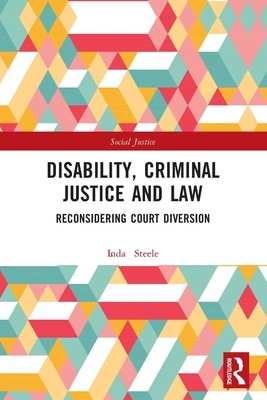
- We will send in 10–14 business days.
- Author: Linda Steele
- Publisher: Routledge
- ISBN-10: 0367498073
- ISBN-13: 9780367498078
- Format: 15.6 x 23.4 x 1.5 cm, minkšti viršeliai
- Language: English
- SAVE -10% with code: EXTRA
Reviews
Description
Through theoretical and empirical examination of legal frameworks for court diversion, this book interrogates law's complicity in the debilitation of disabled people.
In a post-deinstitutionalisation era, diverting disabled people from criminal justice systems and into mental health and disability services is considered therapeutic, humane and socially just. Yet, by drawing on Foucauldian theory of biopolitics, critical legal and political theory and critical disability theory, Steele argues that court diversion continues disability oppression. It can facilitate criminalisation, control and punishment of disabled people who are not sentenced and might not even be convicted of any criminal offences. On a broader level, court diversion contributes to the longstanding phenomenon of disability-specific coercive intervention, legitimates prison incarceration and shores up the boundaries of foundational legal concepts at the core of jurisdiction, legal personhood and sovereignty. Steele shows that the United Nations Convention on the Rights of Persons with Disabilities cannot respond to the complexities of court diversion, suggesting the CRPD is of limited use in contesting carceral control and legal and settler colonial violence. The book not only offers new ways to understand relationships between disability, criminal justice and law; it also proposes theoretical and practical strategies that contribute to the development of a wider re-imagining of a more progressive and just socio-legal order.
The book will be of interest to scholars and students of disability law, criminal law, medical law, socio-legal studies, disability studies, social work and criminology. It will also be of interest to disability, prisoner and social justice activists.
EXTRA 10 % discount with code: EXTRA
The promotion ends in 21d.17:10:52
The discount code is valid when purchasing from 10 €. Discounts do not stack.
- Author: Linda Steele
- Publisher: Routledge
- ISBN-10: 0367498073
- ISBN-13: 9780367498078
- Format: 15.6 x 23.4 x 1.5 cm, minkšti viršeliai
- Language: English English
Through theoretical and empirical examination of legal frameworks for court diversion, this book interrogates law's complicity in the debilitation of disabled people.
In a post-deinstitutionalisation era, diverting disabled people from criminal justice systems and into mental health and disability services is considered therapeutic, humane and socially just. Yet, by drawing on Foucauldian theory of biopolitics, critical legal and political theory and critical disability theory, Steele argues that court diversion continues disability oppression. It can facilitate criminalisation, control and punishment of disabled people who are not sentenced and might not even be convicted of any criminal offences. On a broader level, court diversion contributes to the longstanding phenomenon of disability-specific coercive intervention, legitimates prison incarceration and shores up the boundaries of foundational legal concepts at the core of jurisdiction, legal personhood and sovereignty. Steele shows that the United Nations Convention on the Rights of Persons with Disabilities cannot respond to the complexities of court diversion, suggesting the CRPD is of limited use in contesting carceral control and legal and settler colonial violence. The book not only offers new ways to understand relationships between disability, criminal justice and law; it also proposes theoretical and practical strategies that contribute to the development of a wider re-imagining of a more progressive and just socio-legal order.
The book will be of interest to scholars and students of disability law, criminal law, medical law, socio-legal studies, disability studies, social work and criminology. It will also be of interest to disability, prisoner and social justice activists.


Reviews